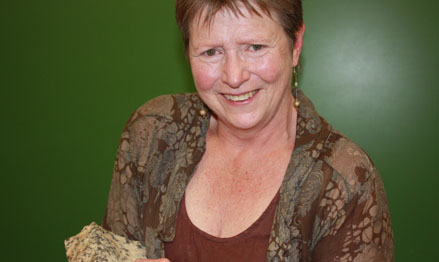Latest News Archive
Please select Category, Year, and then Month to display items
10 July 2018
Photo Supplied
 Shindré-Lee Simmons, one of the veterans in the Kovsie women’s hockey team for this year’s national student championship.
Shindré-Lee Simmons, one of the veterans in the Kovsie women’s hockey team for this year’s national student championship.
The Kovsie men’s and women’s hockey teams have positive expectations for the University Sport South Africa (USSA) national student tournament.
The USSA championships were hosted by the University of the Free State (UFS) from 2 to 6 July 2018. This year’s championships will have 45 competing teams and will thus be the biggest ever USSA hockey tournament.
For the female squad to qualify for the 2019 Varsity Sports tournament, they have to secure a spot among the top-seven teams. In order to get back into the A section, the Kovsie men’s team must win their tournament.
The matches are scheduled to take place on the UFS Bloemfontein Campus astro fields.
The UFS women’s team, captained by Antonet Louw, is set to play on Monday at 15:35 against Nelson Mandela University (NMU); on Tuesday at 17:00 against the University of Johannesburg (UJ); and on Wednesday at 18:25 against North-West University (NWU). The play-off matches will take place on Wednesday, Thursday, and Friday.
The men’s team, with Cheslyn Neethling as captain, will play on Monday at 17:00 against the Central University of Technology; on Tuesday at 15:35 against the Tswane University of Technology; on Wednesday at 17:00 against the Vaal University of Technology; on Thursday at 18:25 against the University of KwaZulu-Natal; and on Friday at 15:35 against Rhodes University.
Prof Tredoux turns theories regarding the formation of metals on its head
2013-09-17
|
 |
|
Prof Marian Tredoux
17 September 2013 |
The latest research conducted by Prof Marian Tredoux of the Department of Geology, in collaboration with her research assistant Bianca Kennedy and their colleagues in Germany, placed established theories regarding how minerals of the platinum-group of elements are formed, under close scrutiny.
The article on this research of which Prof Tredoux is a co-author – ‘Noble metal nanoclusters and nanoparticles precede mineral formation in magmatic sulphide melts’ – was published in Nature Communications on 6 September 2013. It is an online journal for research of the highest quality in the fields of biological, physical and chemical sciences.
This study found that atoms of platinum and arsenic create nanoclusters, long before the mineral sperrylite can crystallise. Thus, the platinum does not occur as a primary sulphur compound. The research was conducted at the Steinmann Institute of the University of Bonn, Germany, as well as here in Bloemfontein.
Monetary support from Inkaba yeAfrica – a German-South African multidisciplinary and intercultural Earth Science collaborative of the National Research Foundation (NRF) – made this research possible. Studies are now also being conducted on other metals in the precious metal group, specifically palladium, rhodium and ruthenium.
The discovery of the nanoclusters and the combination with arsenic can have far-reaching consequences for the platinum mine industry, if it can be utilised to recover a greater amount of platinum ore and therefore less wastage ending up in mine dumps. This will signify optimal mining of a scarce and valuable metal, one of South Africa’s most important export products.
For Prof Tredoux, the research results also prove thoughts she already had some twenty years ago around the forming of platinum minerals. “Researchers laughed in my face, but the evidence had to wait for the development of technology to prove it.” Young researchers were very excited at recent congresses about the findings, since the new models can bring new insights.
“Chemistry researchers have been talking about platinum element clusters in watery environments for quite a while, but it was thought that these would not appear in magmas (molten rock) due to the high temperatures (>1 000 degrees celsius).”
Prof Tredoux has already delivered lectures at congresses in Scotland, Hungary, Sweden and Italy on this research.
Read the article at: http://www.nature.com/ncomms/2013/130906/ncomms3405/full/ncomms3405.html